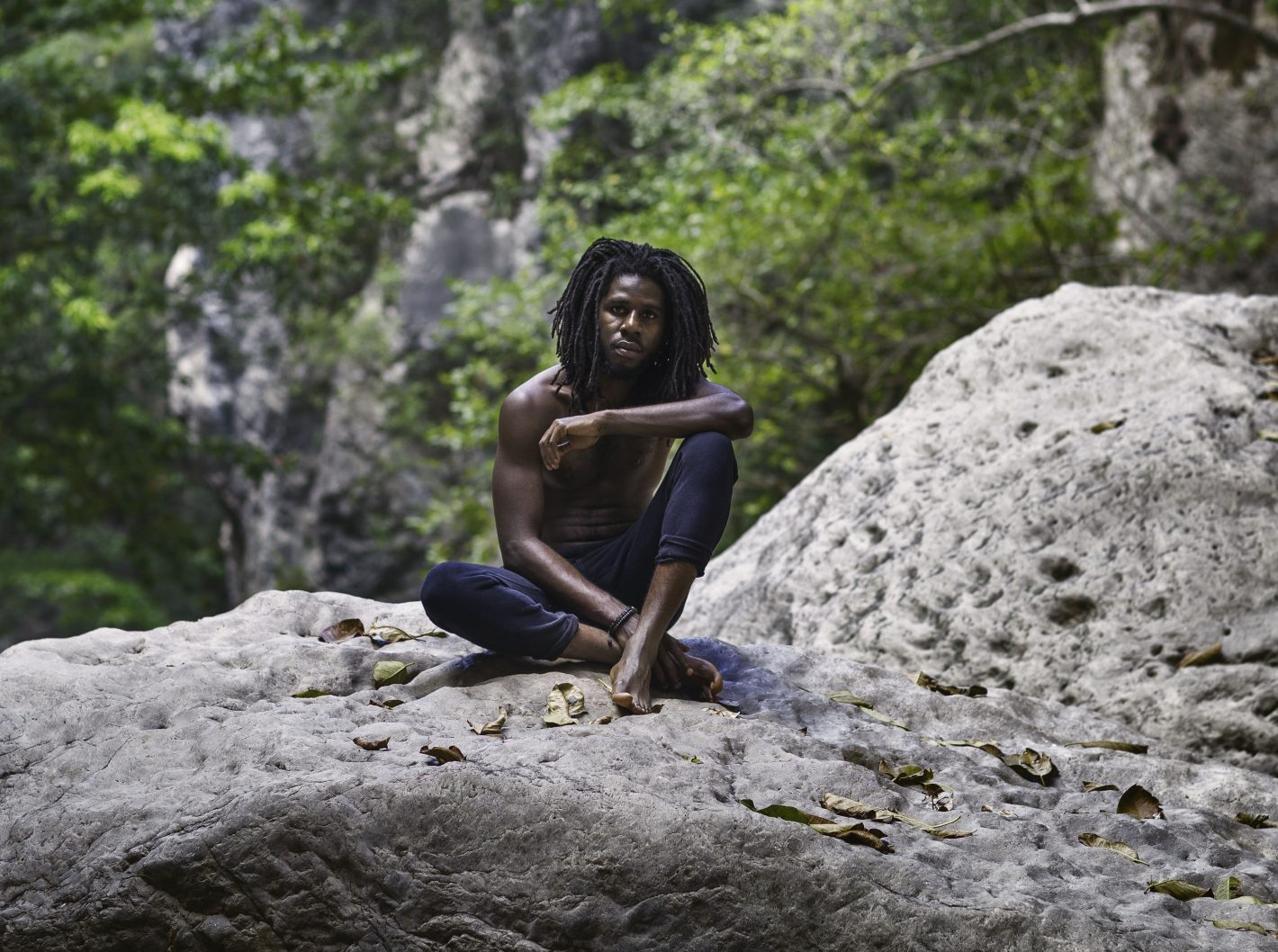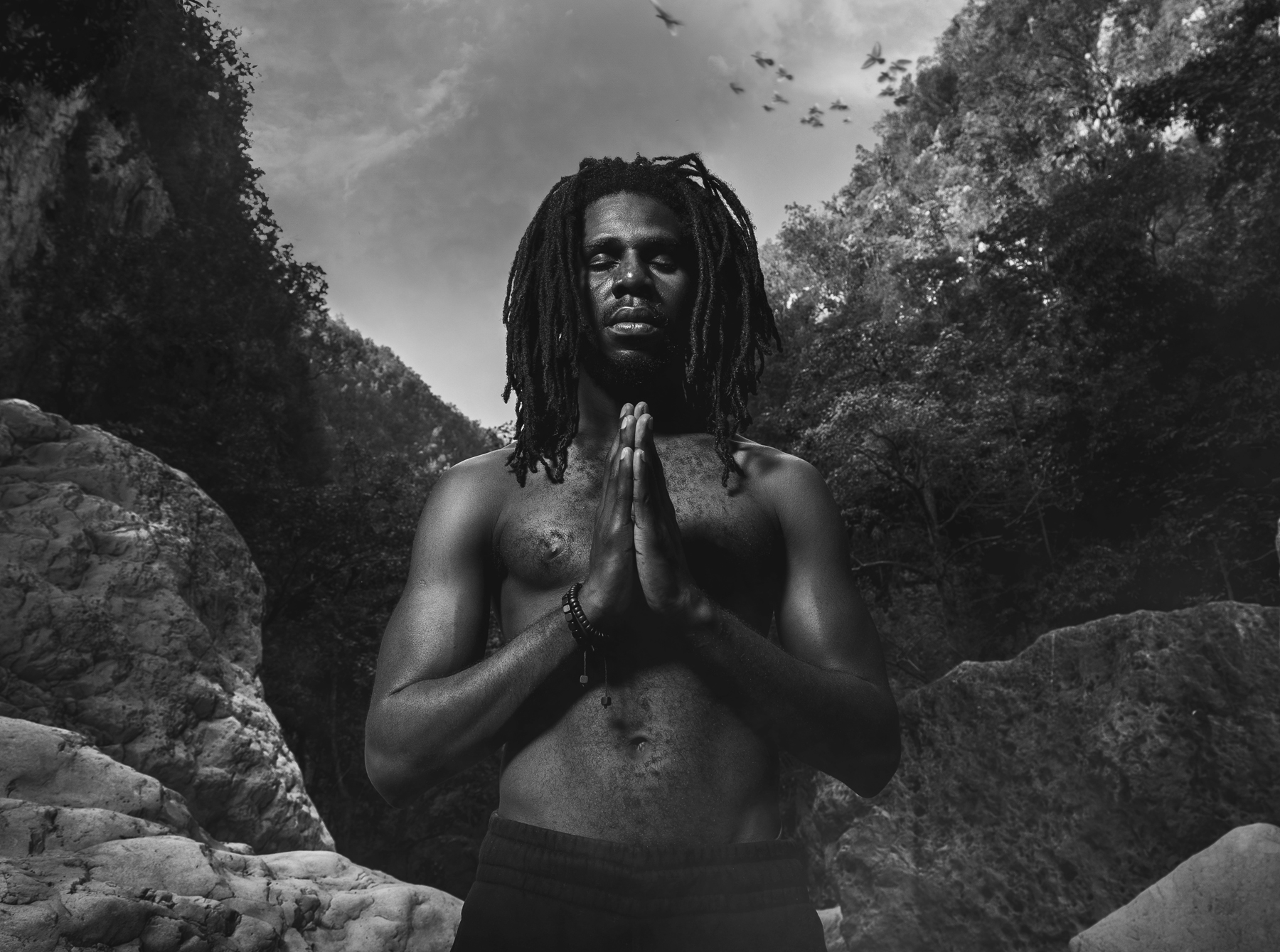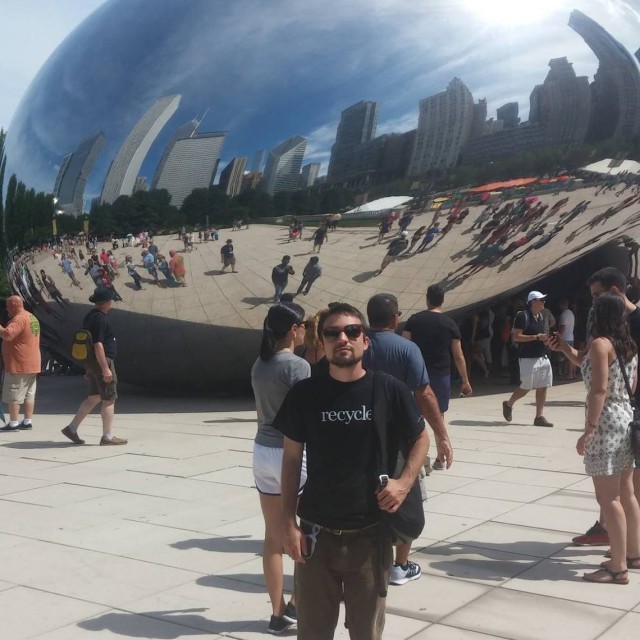 Photos by Che Kothari
Photos by Che Kothari
There is often a fundamental schism between the lovers and the makers of art. As a fan, there can be an urge to let your inner archivist run rampant; to discover obscure genres or codify new ones, deciding who belongs where. For journalists especially, the slightest hint of a new “scene” or “movement” is like blood in the water. That is not to say our intentions are hostile, but even so, our pronouncements can be limiting to the unfettered artistic mind. To declare what is rising or waning, to construct lines separating the “old” and “new,” can seem to the artist like an attempt to place toll on the limitless road of creativity.
Chronixx is well aware of this. In the supercharged, creatively brimming musical climate of Jamaica, where success does not go unnoticed, the artist born Jamar McNaughton has found himself near the epicenter of a young generation of artists who make fresh music with a timeless spirit and are bringing attention back to a more conscious strain of reggae. Because of this, no interview, inquiry or thinkpiece he’s been involved with in the past four years has been able to ignore the alluring, exciting narrative of a “reggae revival” in his island nation, stirring a sea change from the relentless, mammonic drive of dancehall to a renewed focus on roots, people and empowerment.
As is always the case, there is a little bit of truth to all this, but the real story is both smaller in scale and deeper in reach. Chronixx, and fellow artists like Protoje, Jah9, Kelissa, Kabaka Pyramid and Jesse Royal (the list goes on), have no master plan to conquer the world. They would much rather make tunes together, show up at each other’s gigs, and genuinely affect people with music, whether it be one hundred or a hundred thousand. As he would put it, it’s about the love, not the likes.
Chronixx’s roots denote more than his conscious stance and Rastafari lifestyle. He was born into a music family, spinning his name from his father’s own stage name, Chronicle. He’s had a hand in the studio and on the mixer since his early teenage years and was raised among a who’s who of Jamaican musical royalty. Though his diet may be strictly ital, he has a wildly omnivorous ear, soaking up the propulsive riddims of dancehall along with the music that came before it, and listening to the heavenly harmonies of Enya extensively while on tour.
It’s always best to keep your tastes complicated and your approach simple, and Chronixx aims to do just that; building up to his proper debut album, Chronology, he has kept his humble, direct ethos intact on singles like “Smile Jamaica” and ‘Majesty” as well as his 2014 EP Dread and Terrible, even as they propel him towards global fame, including two recent appearances on The Tonight Show Starring Jimmy Fallon. In the meantime, he continues to acknowledge the power of music to transcend political and mental stagnation while avoiding being overtaken by the hype that travels in his wake. Chronology in part refers to the rising spirit of the times, and of Chronixx and his musical compatriots. It is also an idea he gleaned from a history book: our ordering of history is often false, and where we have once assumed a lineal succession—one ruler coming after another, one dynasty toppling the last—we often find that, in reality, there were many rulers, reigning concurrently in relative peace. For Chronixx and his generation, I and I know the reign will be a long and fruitful one.

Why do you think reggae has had and continues to have such a global appeal?
Reggae music is deeply rooted in consciousness, and that for me explains the widespread appeal. Consciousness is something that cannot be contained. Even though reggae music has not really been accepted in the mainstream structure and the mainstream institutions, it is one of the only kinds of music in the world that doesn’t have to be in the top 100 in order to fill festivals with tens of thousands—hundreds of thousands—of people that come to watch every year. Regardless of the number, the people who come out are fully into the music, they know the lyrics and everything. Reggae provides something for people that they cannot find in any other kind of music, which is a comfort from the pressures of the system, a relief and a release from the pressures that society may inflict. Because it has that quality, it catches on naturally. People know what they want and even if it’s not given to them, they’ll find it.
It’s not about the popularity or what is new, louder or faster, it’s the feeling.
Yeah, it moves in a more organic fashion, and it moves slower—in terms of how popular the music gets, the months it takes to reach people in other genres and other countries. In those places, if a song doesn’t break in the first year it’s released, then that’s it, and you move on to the next thing. In Jamaica, you can have a song from 1985 that suddenly becomes very popular in 2017. And that’s the nature of music, the relevance never goes away. Sometimes it feels like it does, but the relevance keeps appearing and manifesting in new ways.
How do you deal with success without compromising your spiritual beliefs?
It happens when you don’t focus so much on success. I try to redefine success on an inner level. I know what success means in the world—I accept that. That is what the world perceives as success, but as far as me and my faith, I redefine it as having your music serve a purpose, which is to uplift and inspire people. Not having a specific number or amount—even if you inspire one person, lift up their life, on a soulful level, so that they are never left the same—I think that’s a very powerful thing. That can’t be considered unsuccessful by anyone who is trying to reach people.
Do you agree that there is a “resurgence” or “revival” of roots reggae?
As far as the resurgence of reggae music is concerned—let me tell you about that. I grew up in a music home, nah mean? My father is an artist, and I grew up listening to all different kinds of music. From when we were children, we considered ourselves to be musicians in training, like, we were always trying to learn new songs, trying new instruments. So from that stage I realized that music is just all in a continuous thing. I can tell you, I think reggae in every period, every year in Jamaica, it feel like the media says and does things for their own benefit. If you just write about the reggae artists, you can do it for a time, but then it becomes boring, so you have to write it in a different way, you have to say, “these brand new reggae artists who out of nowhere have come with a resurgence.” And if you’re gonna talk about a resurgence, I feel like you are now saying that there wasn’t great music being made all along. And there has been, for every single period of my life.
The difference with our generation is just that we weren’t in the scene before now. The music just needed new artists, it’s not like it needed new reggae music—reggae wasn’t dead, it just needed new people with fresh ideas. Our music was already there for like 50 years. For music to survive, new birth have to take place. And for birth to take place, certain things have to happen. We can’t ride media waves, because media waves fade away. If you ride the wave that fades away, it will move on to something else, in the next two years or in the next six months. The greatest thing is to stay true to what you’re doing, and remember that you were doing it before people gave it a name or called it a movement. Just continue.
Would you say the current musical environment is more about cooperation?
Yeah, and we are still finding new ways to collaborate. The thing is, most of us are independent—we are challenged by our inexperience, we are challenged by our limited resources. These challenges are sometimes really positive: we have to be more creative and learn how to do more with less. We’ve always been collaborating, even sometimes when we are not trying to. Like, for instance, I’ll have a show in Jamaica, and even without trying, my performance end up having six to 10 guest musicians. And there’s all these other kinds of artists that come up in this [movement]—photographers, directors, guitarists, drummers, bass players, singers, writers, producers—who are now emerging, who collaborate sometimes without even realizing.
How would you describe your album Chronology and the idea behind it?
I consciously made the decision not to judge or have any expectations of this album in terms of my career—it wasn’t a career project. It’s just something that I really needed to do. And I guess the music will reflect that. I didn’t do this to celebrate what happened in the media a few years ago with the “resurgence of reggae music.” It’s not one of the albums that come out of that in any way. I didn’t put it out because I need to have something playing on the radio. [Laughs] It makes me nervous—I know people will appreciate it for sure, because all people want is inspiration. But in terms of the industry and the career aspect of it, I’m not sure how much my career will benefit from this. But it’s something I really needed to make, and that made it important. I did it and I enjoyed it, and I’ve never experienced such growth as a musician ever in my life.
It’s called Chronology because I was reading a book showing history, from Egypt come to now. Basically, history keeps changing, and as we grow we keep hearing about planets that we haven’t heard about, we keep hearing about kings and queens from long ago that we didn’t hear about. There was a concept in the book called the new chronology, where some new scientists recently found that the kings of Egypt and the queens of Egypt, a lot of them were ruling concurrently, and not one after the other. A lot of the people that we thought were usurped or overthrew the other were actually ruling together, like five, six kings and their queens at the same time. I think in music, this whole thing of chronology is showing that yo, I didn’t really come after he, and he didn’t really come after me, and they didn’t really come before we. We all are doing this at the same time, we are carrying the energy and pushing it and Jamaican music forward. I say Jamaican music because we can’t overstate reggae, we can’t overstate ska. It’s the same thing. When you look at chronology, when you look at the history and art of Jamaican music, you’re saying, “Alright, it was ska, and then it was this, and then it was that.” But there was a time that ska and rocksteady were happening at the same time, if even for a short period. You have Toots [from Toots and the Maytals] who out of his performance of traditional Jamaican folk music mixed blues and funk, and all of those kind of music—he came up with reggae. And then you have a lot of Spanish music influence in our music on top of that. I personally have spent my whole life trying to learn the truth about our music, and this album reflects that 100 percent.
So, it’s not for people that look up and listen to five songs and think they know what reggae is. This album is for you to humbly listen to music with your heart open. Don’t try to label it, you may just find out something very interesting. Just open your heart and listen to the words and the instruments. You might just hear something that you never hear before.
Chronixx joins special guests Max Glazer and Jah9 on Tuesday, March 21, 2017, at Sacramento’s Ace of Spades, located at 1417 R. St. Tickets are $24 in advance ($27 at the door) and available online at Aceofspadessac.com.


Comments